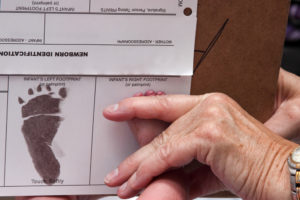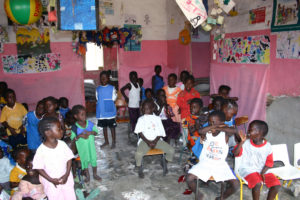Children have the right to have their births registered and it falls to parents to respect this right, which is enshrined in article 51 of Senegal’s Family Code. Section 2 of the Code, which dates from 1972, states: “Every birth must be declared to the appropriate authority within one month”. The paradox of this legislation is that thousands of school-aged children lack a birth certificate as they were not registered within a month of being born. Other children are the victims of swindlers who pose as government officials and give out fake birth registration numbers in exchange for money (africatime). As a result, a number of these children are unable to enrol in school, while others do manage to enrol but are forced to drop out as they are unable to sit exams due to their lack of the legal documentation needed to be entered for exams.
 Consequently, in addition to losing their right to a legal identity because of a failure to register their births, these children lose their right to education and training. This situation demands an increased level of responsibility on the part of those parents who refrain from registering their children’s births as well as on the part of the state, which should do all it can to restore the rights of those children whose births were not registered.
Consequently, in addition to losing their right to a legal identity because of a failure to register their births, these children lose their right to education and training. This situation demands an increased level of responsibility on the part of those parents who refrain from registering their children’s births as well as on the part of the state, which should do all it can to restore the rights of those children whose births were not registered.
Birth registration : a child’s right
A birth can be registered by “the father or mother, a close relative, the midwife, doctor, hospital matron or any other person who attended the birth, or else (…) by the person on whose premises the woman gave birth” (Article 51 of Senegal’s Family Code). A birth can also be registered by the neighbourhood representative, the village chief, or the public prosecutor.
Regardless of when the decision is made to register the child’s existence, there is always a clear procedure to follow depending on the circumstances. For example, in addition to normal birth registration, there is delayed registration, or authorization to register. Despite these provisions, the problem of unregistered children remains. According to Senegal’s agency for Statistics and Demographics (part of the Ministry of the Economy, Finances and Planning), nearly one quarter of children (23.8%) aged between one and nine possess neither a birth certificate nor any other official documentation. “By the time they turn one, 25.6 percent of children remain unregistered.” (APS, 2015).
 This situation is due to negligence on the part of those individuals whose duty it is to register the birth, especially the parents. However, many of the parents are ignorant of the procedures and of the law and lack birth certificates themselves, especially in rural areas (APS, 2015), where illiteracy and lack of information are common (BA, 2015).
This situation is due to negligence on the part of those individuals whose duty it is to register the birth, especially the parents. However, many of the parents are ignorant of the procedures and of the law and lack birth certificates themselves, especially in rural areas (APS, 2015), where illiteracy and lack of information are common (BA, 2015).
And thus it is that these children are deprived of all the benefits that come with having a legal identity. Among these benefits and rights are the financial advantages of the institution of the family and free hospital care for children aged under five.
Lacking a legal identity is an obstacle to a child’s education
A lack of a birth certificate is a major obstacle to children’s education. This is because in order to enrol in a school, a birth certificate is required, yet a child whose birth was never registered has no certificate to show. Even if the requirement is waived and the children can enrol, they cannot sit end-of-school exams. The result is that schools have no shortage of students who will be excluded from sitting exams because they have no identification (Ndiaye, 2016). The Director of Examinations has stated that ‘34,670 candidates for the certificates showing completion of elementary school and middle school lacked the necessary documentation in 2016, compared to 53,240 in 2015’ (Dieng 2016). If these tens of thousands of students cannot obtain a birth certificate before the end-of-year exams are held, they have to wait until the next academic year to sit the exams.
 The heads of some elementary schools are required to help these students with authorized registration procedures before a tribunal or at public forums that the state organizes from time to time. This commitment from teachers allows some young students to obtain a declaration of birth and, consequently, to stay in school. If neither the school nor the parents act, a child will often drop out of school. (Dabo, 2015).
The heads of some elementary schools are required to help these students with authorized registration procedures before a tribunal or at public forums that the state organizes from time to time. This commitment from teachers allows some young students to obtain a declaration of birth and, consequently, to stay in school. If neither the school nor the parents act, a child will often drop out of school. (Dabo, 2015).
written by: Khady Ngom translated by : Bronwen Claire Ewens Proofread by : Garen Gent-Randall |
Fatou, S., (01/07/13) Etat-civil au Sénégal : Dans le labyrinthe des faussaires, consulté sur africatime.com : http://fr.africatime.com/senegal/articles/etat-civil-au-senegal-dans-le-labyrinthe-des-faussaires
Dabo, B., (1/07/2015) Sénégal : La problématique de l’état-civil en milieu scolaire, consulté sur allafrica.com : http://fr.allafrica.com/stories/201507011702.html
Ndiaye, I., (13/10/2016) Enregistrement à l’état civil : L’acte de naissance, facteur d’exclusion des élèves de CM2, consulté sur lesoleil.sn : http://www.lesoleil.sn/actualites/item/56443-enregistrement-a-l-etat-civil-l-acte-de-naissance-facteur-d-exclusion-des-eleves-de-cm2.html
APS, (2/06/2015) Régularisation des élèves sans acte de naissance, consulté sur seneweb.com : http://www.seneweb.com/news/Societe/regularisation-des-eleves-sans-acte-de-n_n_183987.html
ADIE, (n.d.) Enregistrer une reconnaissance d’enfant, consulté sur servicepublic.gouv.sn :
http://www.servicepublic.gouv.sn/index.php/demarche_administrative/demarche/1/327
Extrait du Code de la famille sénégalais Section 2 (12/06/1972). Paragraphe premier. Des actes de naissances, consulté sur : http://www.cape.gouv.sn/IMG/pdf/extraits_code_de_la_famille.pdf
Dieng, M. S., (3/06/2016) 34 670 candidats aux examens sans pièce d’état civil, consulté sur : http://www.seneweb.com/news/Societe/34-670-candidats-aux-examens-sans-piece-_n_184074.html
Ba, M., (18/11/2015) Modernisation de l’Etat civil au Sénégal – Un satisfécit mitigé, consulté sur rewmi.com : http://www.rewmi.com/modernisation-de-letat-civil-au-senegal-un-satisfecit-mitige.html
Ministère de l’Economie, des Finances et du Plan, (2015) L’enregistrement des faits d’état civil au Sénégal : mariages, naissances et décès, consulté sur : http://www.ansd.sn/ressources/publications/RAPPORT%20ETAT%20CIVIL%20DEC%202015-BECPD.pdf


